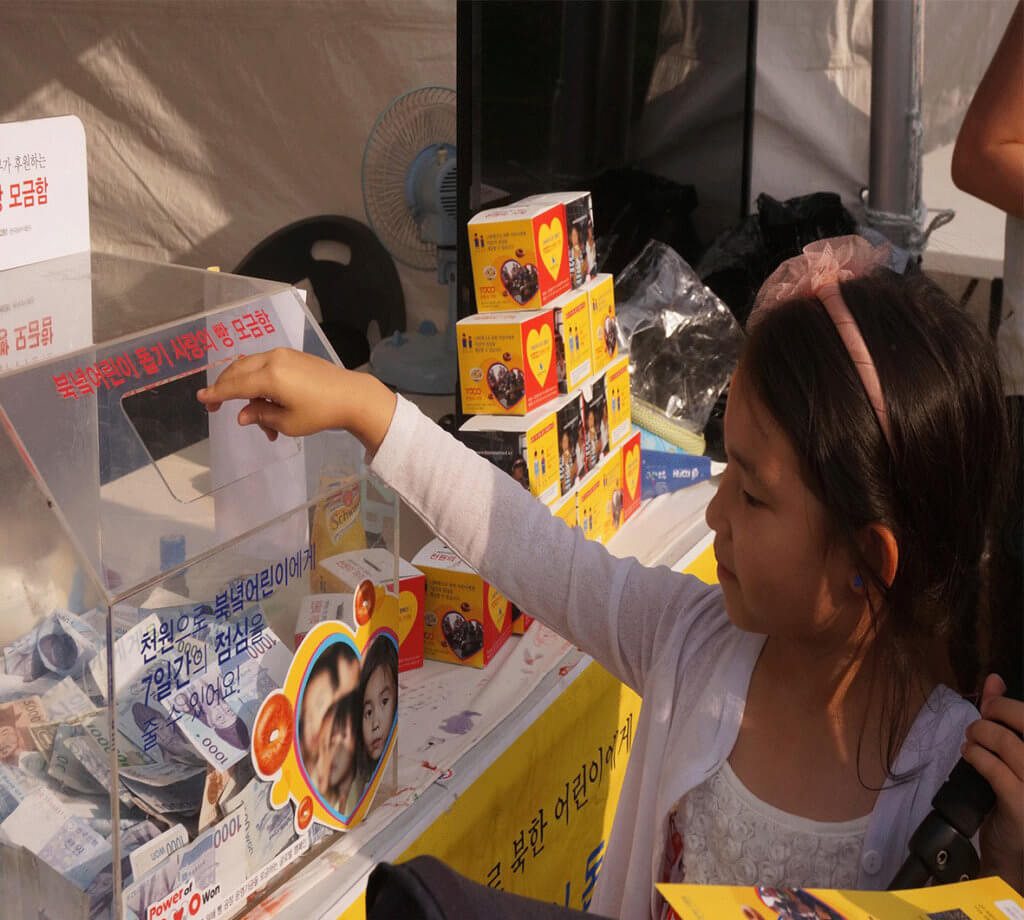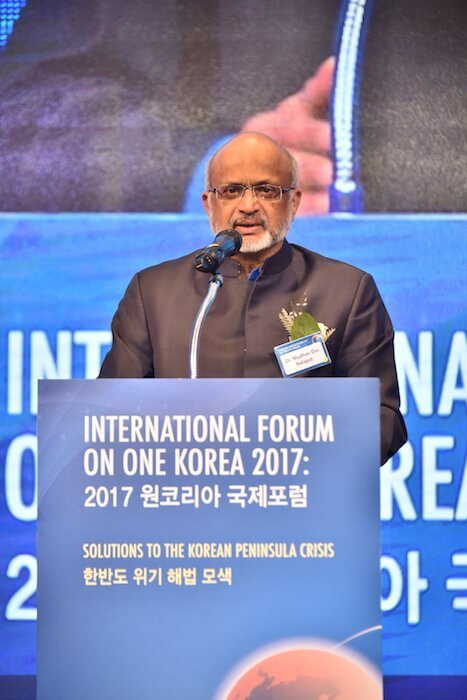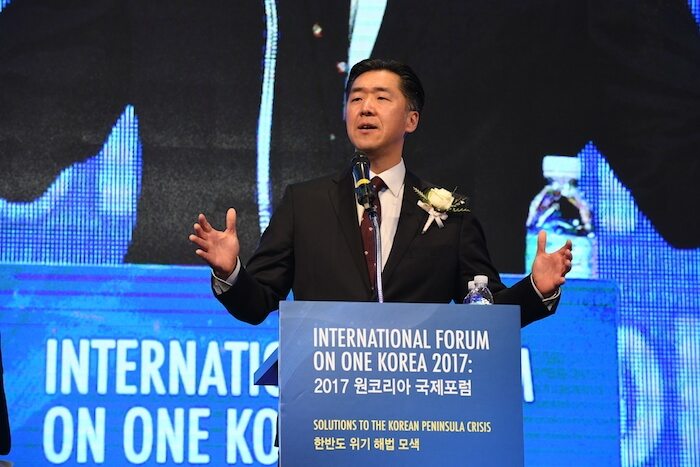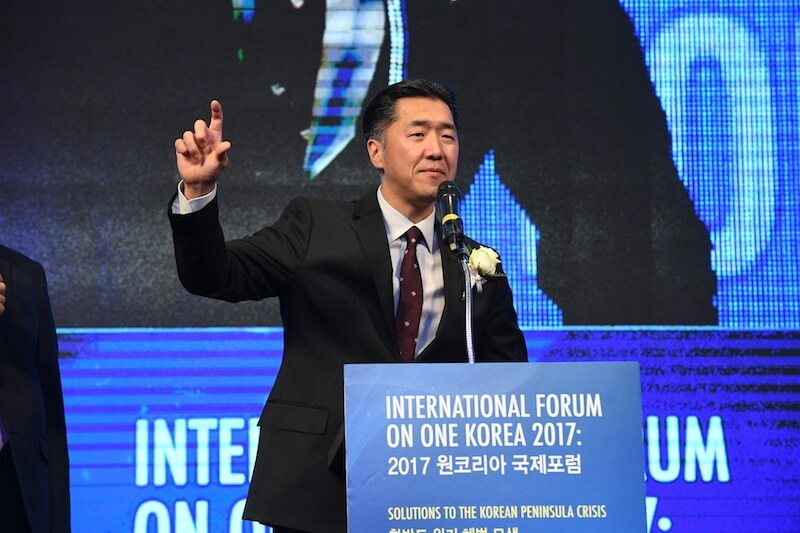“The following address was delivered by Dr. Hyun Jin P. Moon at the 2017 International Forum on One Korea held in Seoul Dragon City Hotel – Seoul, South Korea on December 7, 2017.
Distinguished partners of the Global Peace Foundation, honorable National Assembly members, all the sponsoring organizations and agencies that are participating in this conference: Congratulations for this noble effort. Let’s give everyone a round of applause.
As the previous speakers have suggested, we live in precarious times. That is especially true here in South Korea. Many of us are numb to the situation since we have been dealing with the threat of potential conflict on the peninsula ever since the armistice in 1953. So, it’s very easy for us to fall back into the old frameworks of thinking within which we have endured the last 70 years. But today we need to be aware that the entire calculus has changed.
I am a student of history. In my senior year at Columbia University, I wrote my honors research paper on the interwar years between 1945 and 1950, the outbreak of the Korean War. In fact, this has been an interest of mine ever since I was a young boy because my family was steeped not only in Korea’s fight for liberation under the colonial yoke of Japan, but also thereafter in trying to bring peace on the peninsula. As a student, I earnestly sought to understand what were the fundamental issues that arose after Korea achieved liberation from Japan. Because although Korea is an ancient civilization that goes back 5,000 years, the division of the Korean peninsula has been a reality that Koreans on both sides of the border, North and South, have been living with for the last 70 years. And yet, when Koreans speak of these issues today, they speak within that recent framework, within the narrative of division.
“The separation of the Korean people was not the desire of the Korean people. It was a foreign construct…”
What happened after 1945 is a tragedy when you look at Korean history from its beginning up to that point in human history. The separation of the Korean people was not the desire of the Korean people. It was a foreign construct imposed on the Korean people at a time when they hoped that a nation that had been subjugated and stripped of its identity, and a people that had their hopes shattered, could finally realize the dream that had animated them and their ancestors for 5,000 years. The division of the Korean people is the expression and consequence of that tragedy. And yet, today, South Koreans look upon this division as if it is a reality that they are bound to accept.

Along with awareness campaigns for peaceful reunification, Action for Korea United provides humanitarian aid through projects like 1000 Won, giving bread to children in North Korea.
When I started this Korea reunification movement in 2010, the first key issue that we had to address was how to build a vision that allows the Korean people, together with all sincere well-intentioned individuals, parties, and nations that want to resolve the problem on the Korean peninsula to recognize, first and foremost, that the ideological construct of the Cold War was no longer relevant, not only for the Korean people, but for this age in which we live. What we needed was a vision that could unite the Korean people, North and South, that was not tainted by any foreign constructs, but was uniquely Korean, and that defined the identity of the Korean people.
The book I authored in 2014 under the title of the “Korean Dream” was an effort to build that vision. Now remember, up until that time, there was no Korean Dream. In that book, in dealing with the issue of Korea’s reunification, I touched upon the history of the Korean people, most importantly, the founding mythology upon which the Korean people’s identity and national sense of destiny was formed. Hongik Ingan, which is known to all Koreans, became a word that was recognized by the rest of the world, and it articulated this national destiny and vision around which I wrote that book. The book was a vision of a unified peninsula, and of a unified people that has the shared destiny to serve all humanity and set the example of a model nation for all nations to follow.
We have heard speakers from the international community. They have pointed out very clearly that, today, we live in precarious times. Right now, the United States and North Korea are on a course headed towards conflict. During the historic trip of the American president to Asia, and especially to South Korea, he articulated the agenda of his administration, that the United States will not allow North Korea to become a nuclear threat to the United States or any of its allies. What that means, we have yet to see.
Of course, Kim Jong Un’s administration, like his father’s and his grandfather’s, has been looking towards the development of nuclear weapons. Yet, the commitment to pursue nuclear weapons and, with them, the ability to attack the United States has accelerated exponentially during the Kim Jong Un administration. They are steadfast in their commitment to develop a nuclear North Korea. Under this scenario, there are only two options: Either through some type of diplomacy North Korea stops its nuclear program, or there is conflict.

Dr. Madhav Das Nalapat, Director of Geopolitics and International Relations and UNESCO Peace Chair at Manipal University in India, speaks at the International Forum on One Korea 2017
So, the issues that Dr. Nalapat raised in his address are very real. Yet, being a person who believes in God and in providence, and especially as someone who has faith in the destiny of the Korean people, I believe that there is another option. I believe that this crisis can become an opportunity that can finally end the cruel chapter of a divided Korea that has been imposed upon the Korean people. I believe that this is a moment in time when Koreans can take charge of their own destiny, when we can design and define our own future, a future not of division but where we are united as one, and where we realize the providential charge inherent in the vision of Hongik Ingan, to live for the benefit of all humanity.
If you are a student of history, you know there are moments in time that can define an age. I believe we live in such a time. For the first time in the geopolitics of this region, the most influential nations are recognizing the importance of the peninsular issue. As a Korean who lives in America, for the first time in my memory, and as a student of American history, for the first time in American foreign policy, there is a fundamental shift. Korea is no longer an afterthought but has become the most important priority in American foreign policy.
So instead of talking about opinion, let’s talk about facts regarding what is happening geopolitically in this region today. For the first time in this region’s history, the United States has got China to agree to financial banking sanctions against North Korea. Never was there this level of cooperation between the two most important powers within the region. I believe these banking and financial sanctions will have huge implications for North Korea.
We need to begin by realizing that North Korea is a rogue state that has been engaged in activities that all the civilized nations of the world have condemned North Korea for. That will not change. Within North Korea today, we are witnessing the rise of the black market. Instead of looking at this as a negative, I view it as a positive, very much like what happened in the Soviet Union, where the free world sanctions on the Soviet Bloc led to the rise of black markets. This then led to the inflow of information to the people of the Soviet Union, leading them to understand that their system was not as good as the systems of the West.
Today, we have multimedia technology that did not exist 10 to 20 years ago. Today all you need is a smart phone and you have access to the rest of the world. What will happen with the rise of the black market in North Korea? Every dictatorial regime fears most not having control over its own population. You are going to see the erosion of the Kim regime, not from outside pressures, but from within. This is the opportunity for South Korea. The world is now watching the Korean peninsula. Everybody is wondering how to move forward. Even with America’s commitment to the denuclearization of the Korean peninsula–they still have not developed their policy yet. Everything is in the air, and this is where the opportunity lies. And that is why vision is so important.
How do we build consensus, not only here in South Korea but among the international community, to find a solution to this global crisis? As a person of faith and as someone whose family has been committed to the reunification of the Korean peninsula, I think there is only one option. Beyond the two options that the North Korean regime and the United States are currently headed towards, there is a third way and that is the peaceful reunification of the Korean peninsula. If we accept this as the desired end goal, then we can deal with the denuclearization issue in that context, but, more importantly, we close the chapter of the divided Koreas, and open up a new chapter of a united Korean people fulfilling their national destiny in line with the Hongik Ingan ideal to serve all humanity.
This is extremely important, and the onus for making progress lies upon South Korea. The problem with South Korea right now is the extent of the divisions over national goals and the many assumptions that South Koreans make that fall within that outmoded Cold War framework and does not take into account the current geopolitical crisis because they have been numbed to the realities of Korea’s division. That is why conferences such as this and initiatives such as AKU are so significant in the history of our people, because they bring vision and clarity to the way forward in this time of global crisis.
My hope is that the Moon Jae-in administration recognizes the historic opportunity that it has been afforded and sets as the national agenda of South Korea the peaceful reunification of the Korean peninsula. This then becomes the only sound and reasonable alternative for dealing with the nuclear issue and, within this new geopolitical environment, nations start to formulate their policies in terms of how to deal with the Korean nuclear issue. More importantly, such an agenda will bring an end to the tragedy that was imposed upon the Korean people throughout the 20th century; the tragedy of colonialism, and the tragedy of a divided peninsula due to the ideological conflict between communism and the free world.

Dr. Hyun Jin P. Moon at the International Forum on One Korea in Seoul
I want to remind Koreans that in 1948, there was to be a national election for a united Korean government. Yet, those elections never took place, and the two governments of North and South Korea were formed instead, reflecting the ideological divide of the Cold War. If we look at the current existence of two nations within the context of Korean history, we have to recognize that this is but a transitory process. All Koreans, North and South, should recognize that the existence of these two governments was meant eventually to lead to a unified Korea and that these two governments represent a transitory process for the creation of one unified Korean nation.
I would like to remind my good friend, Dr. Nalapat, of one thing. I think it would be a grave mistake for the international community to recognize the national identity of North Korea. The position of the free world was that South Korea represented the Korean people, and, in the North, it has always been the intention of the grandfather’s regime, the father’s regime, and now the son’s regime to gain recognition as the legitimate representative of the Korean people from the international community. That should never happen. These two governments represent a transitory moment in the story of the Korean people. The end of that story should be the formation of a new nation that all Koreans, both North and South, can call their home and that upholds the fundamental values that the Korean people were founded upon, etched in the Hongik Ingan ideal. That is why I believe it should be the national policy of South Korea to lead in that effort and to pursue that agenda, regardless of which party, left or right, is in power. This should be the stated mission and goal of South Korea.
We stand, as I said, at an inflection point in history. Next year South Korea will host the Pyeong Chang Winter Olympic Games. It reminds me of 30 years ago when I, as a young man, representing the Republic of Korea as one of its athletes, participated in the Seoul Olympic Games. 1988 was a historic year for South Korea, because it also marked the first transition to a democratic political process. More importantly, South Korea became the central focus point where the world community, both the Soviet Bloc and the free world, came together for the first time after the boycott of the LA Games by the Soviet Bloc, and of the Moscow Games by the United States and the free world. Next year, the Olympics will be coming back to South Korea at the very moment that the nuclear crisis on the Korean peninsula is at its hottest and global attention is once again focused on the peninsula. This is a historic moment, a most historic moment.
Then in 2019, we will celebrate the 30th anniversary of the end of the Soviet Union, represented in history by the breaking down of the Berlin Wall that divided east and west. Still more significant for Koreans, it marks the centenary of the March 1st, 1919 movement for independence from which the founders of both South and North Korea emerged. When I wrote my book, the “Korean Dream”, in 2014, I looked to history and to vision to unite the two Koreas and free them from the Cold War framework that was imposed upon us. What better way to remind the Koreans in both Koreas of the hopes, the dreams, and the aspirations of the independence fighters who sought to create a model, ideal nation following the precept of Hongik Ingan.
One reason why this anniversary can become a global phenomenon is because the March 1st, 1919 movement inspired nationalist movements for independence around the world, and especially the young Mahatma Gandhi who later adopted the practices of nonviolent protest of the March 1st movement to achieve the national independence of the Indian people from British colonial rule. If we understand this historical fact, we must realize that the Korean people laid a seed in the 20th century that should blossom in the 21st century, and lead the world to peace by solving the most important geopolitical issue in the world today, which is the crisis on the Korean peninsula. What better way to galvanize global opinion, and what better way for us as Koreans to reignite our sense of our own Korean identity and our sense of our destiny as one people and one nation undivided?
I want to invite all of you to participate in the One Korea Global Campaign activities that are tied to the centennial celebration of the independence movement that inspired the hopes of the Korean people. On this foundation we will pursue the development of a new Korean nation that can be an inspiration to the rest of the world.
Thank you very much.
Watch Dr. Hyun Jin P. Moon’s speech:
Read Dr. Hyun Jin Preston Moon’s book: Korean Dream: A Vision for a Unified Korea

